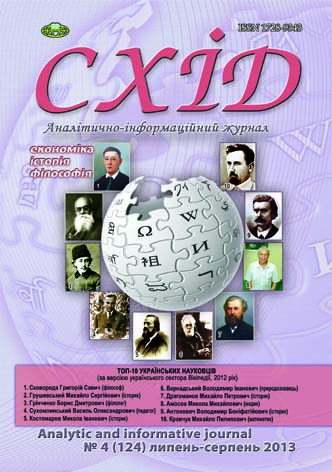The specificity sociocultural mechanism of reproduction South Korean sociality
DOI:
https://doi.org/10.21847/1728-9343.2013.4(124).16980Keywords:
mentality, social values, social and cultural mechanism, a South Korean sociality, customs, rituals, pragmatism, business language, business communicationAbstract
The study examines some of the factors of socio-cultural mechanism, playback of South Korean society, namely: social values, mentality, business etiquette and language of business communication. It is proved that South Korean society hierarchical and authoritarian. The increasing role of South Korean society in the development of the globalization of world coordinates, causing interest in the mechanisms of reproduction of social and cultural component of South Korean society, which is today a fruitful field for socio-philosophical analysis of social and cultural thought. Sociocultural approach involves an analysis of the functions and structures, and structural functionalism includes culture as one of the most important structures (though it functions more local). Both serve as concrete forms systemic approach, expressing particular social (cultural) objects.
South Korean society failed to preserve their national identity and bring the Korean cultural tradition, the new and modern sense. In today's South Korean society, the widespread tendency of cultivation and underscores cultural mechanisms of traditional motifs playing their sociality. Human behavior, as part of the South Korean sociality must conform to the natural order, and in public relations to the forefront the idea of coherence and harmony.
After analyzing the specific socio-cultural reproduction mechanism mention South Korean society Korean commitment to Confucian ethics of preaching diligence, thirst for education, discipline, respect for elders, worship health, business communication and others. Analysis of deep historical and enduring social value structures, the South Korean sociality, their national archetypes determine certain characteristics of social reproduction South Korean in a single global space is fully used today, government and business to develop and promote South Korean society in the modern world of globalization coordinates.
Downloads
References
ЛІТЕРАТУРА
Бычкова Т. А. Культура традиционных обществ Китая и Японии / Т. А. Бычкова. - Томск : Издательство Томского университета, 2002. - 63 с.
Деловой этикет в республике Корея [Електронний ресурс]. - Режим доступу : http://www.docme.ru/doc/127671/.
Здоровье в Южной Корее [Електронний ресурс]. - Режим доступу : http://www.osk-ins.ru/temp/vest_osk_1_may.pdf.
Ким А. В. Место и роль религии в менталитете корейского народа [Електронний ресурс] / А. В. Ким. - Режим доступу : http://nauch-tr.dgtru.ru/attachments/article/17/7.pdf.
Лапин Н. И. Социокультурный подход и социетально-функциональные структуры [Електронний ресурс] / Н. И. Лапин. - Режим доступу : http://ecsocman.hse.ru/data/020/174/1217/001.LAPIN.pdf.
Поняття цінностей та їх роль у суспільстві [Електронний ресурс]. - Режим доступу : http://phil.org.ua/.
Ли Кван Сун. Социально-философский анализ семьи (на примере корейской семьи) [Електронний ресурс] / Ли Кван Сун. - Режим доступу : http://www.socionauki.ru/journal/articles/128790/.
Сим Л. К вопросу о корейском менталитете: прошлое в настоящем / Л. Сим [Електронний ресурс]. - Режим доступу : http://world.lib.ru/k/kim_o_i/s6s6.shtml.
Смертин Ю. Г. Корейский шаманизм: прошлое в настоящем / Ю. Г. Смертин // Мир Востока: ежегодник факультета востоковедения института экономики, права и гуманитарных специальностей. - Краснодар, 2003. - С. 33-37.
Чусок - праздник в Корее и родительский день для корейцев в СНГ [Електронний ресурс]. - Режим доступу : http://kore-saram.ru/Blogs/pisma/.
Korea, South Social Structure and values [Електронний ресурс]. - Режим доступу : http://www.photius.com/countries/korea_south/society/188.html.
Lin Y. My country and my people / Y. Lin. - London : William Heinemann, 1936. - 224 p.
Munro D. Individualism and holism: Studies in Confucian and Taoist Values / D. Munro. - London, 1985. - Pр. 1-34.
Traditional society and culture of the East. Library of Congress Hall: The Politics and Spirituality [Електронний ресурс]. - Режим доступу : www.loc.gov.
REFERENCES
Bychkova T. A. (2002), Сulture of traditional societies of China and Japan, Tomsk, 63 p. (rus).
Business Etiquette in the Republic of Korea, available at: http://www.docme.ru/doc/127671/ (rus).
Healthcare in South Korea, available at: http://www.osk-ins.ru/temp/vest_osk_1_may.pdf (rus).
Kim A. V. The place and role of religion in the mentality of the Korean people, available at: http://nauch-tr.dgtru.ru/attachments/article/17/7.pdf (rus).
Lapin N. I. Socio-cultural and societal approach-functional structure, available at: http://ecsocman.hse.ru/data/020/174/1217/001.LAPIN.pdf (rus).
The concept of values and their role in society, available at: http://phil.org.ua/ (ukr).
Lee Kwang Sun. Sotsialno-filosofski analiz semi (na primere koreiskoi semi), available at: http://www.socionauki.ru/journal/articles/128790/ (rus).
Sim L. On the Korean mentality: the past in the present, available at: http://world.lib.ru/k/kim_o_i/s6s6.shtml (rus).
Smertin Yu. G. (2003), Korean shamanism: the past in the present, Krasnodar, pр. 33-37 (rus).
Chusok - holiday in Korea and Parents’ Day for Koreans in the CIS, available at: http://kore-saram.ru/Blogs/pisma/ (rus).
Korea, South Social Structure and values, available at: http://www.photius.com/countries/korea_south/society/188.html (engl).
Lin Y. (1936), My country and my people, London, 224 p. (engl).
Munro D. (1985), Individualism and holism: Studies in Confucian and Taoist Values, London, p. 1-34 (engl).
Traditional society and culture of the East. Library of Congress Hall: The Politics and Spirituality, available at: www.loc.gov (engl).
Downloads
Published
How to Cite
Issue
Section
License
Copyright (c) 2013 Igor Semenyuk

This work is licensed under a Creative Commons Attribution-NonCommercial-NoDerivatives 4.0 International License.
1. Authors bear responsibility for the accuracy of facts, quotations, numbers and names used.
2. Manuscripts are not sent back.
3. The publisher does not always agree with the authors' opinion.
4. The authors reserve the right to authorship of the work and pass the first publication right of this work to the journal under the terms of a Creative Commons Attribution-NonCommercial-NoDerivatives 4.0 International License. This license allows others to distribute (copy) the published work for non-commercial purposes, provided there is mandatory attribution to its authors and a link to the first publication in our journal.
5. The authors have the right to conclude separate supplement agreements that relate to non-exclusive work distribution in the form in which it has been published by the journal (for example, to upload the work to the online storage of the journal or publish it as part of a monograph), provided that the reference to the first publication of the work in this journal is included.

